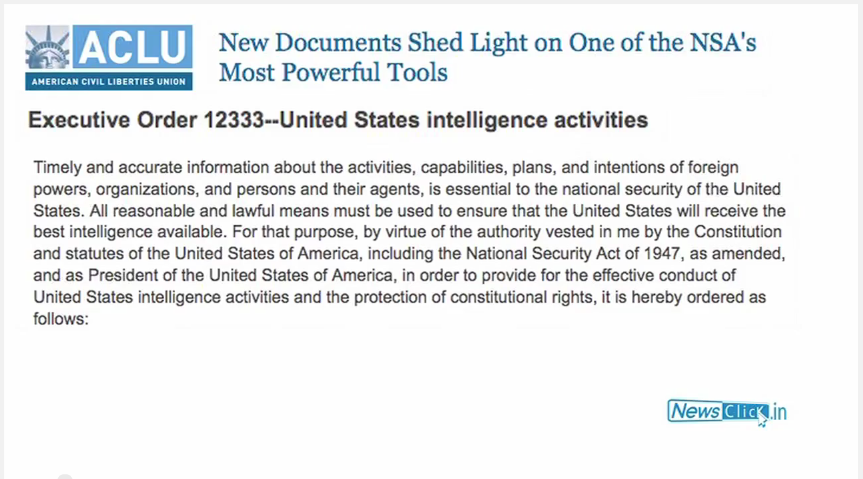US Surveillance: An Analysis of EO 12333 and Its Global Implications
US Mass Surveillance: New Documents Shed Further Light on the Unethical Practices of the US Intelligence Agencies The American Civil Liberties Union has released new documents, which further detail the mass surveillance carried out by the United States over foreign and its own citizens. In particular, the documents show how the US intelligence community relies on an Executive Order – issued by President Reagan in the 1980s – to spy upon the global populace. Much of the discussion in the US has focused on amendment or reform to the PATRIOT Act and FISA. However, it is clear now that this is insufficient. Newsclick examines the contents of these new documents and what it means for the rest of the world in this discussion with Prabir Purkaystha, convener of the Just Net Collation and Chairperson of the Society for Knowledge Commons. Notably, the documents show the kind of obfuscation and ambiguity that the intelligence agencies thrive on – by discarding commonly accepted definitions of various terms and replacing them with jargon that only those versed in deception can detect, intelligence agencies manage to avoid public scrutiny and debate
Given that the US intelligence agencies essentially have no limitations on spying on 96% of the worlds citizens, what can we do to protect ourselves, our economies and societies from this unprecedented dragnet surveillance?

Rough Transcript:
Rishab Baily (RB)- Hello and welcome to Newsclick. The American Civil Liberties Union recently released a series of documents that casts further light on the murky practices of the US intelligence agencies. The documents confirmed that not only our all foreign citizens fair game for the US intelligence agencies but there are absolutely no minimization or oversight mechanisms regarding global surveillance. Now the documents show that most surveillance is actually carried out under the authority of executive order rather than the 2 legislations which we have most often talked about in this context, that is, the Patriot Act and the FISA. Now under these 2 legislations intelligence agencies can compel information, given to them, without actually complying with traditional burden of proof requirements, such as, for instance, showing probable calls. Now the infermis NSLs are also issued under these legislations. Now despite plenty of talk of reform domestically of the Patriot Act and FISA, it appears now that most surveillance is actually carried out under the Executive Order 12333. However, these very little public debate, on actually reforming this Executive Order, which has not even seen any public debate, about the balance of rights and obligations in this order. Now, to discuss the latest documents, we have with us, Prabir Purkayastha, Convenor of the Just Net Coalition and Chairperson of the Society for Knowledge Commons. Now, this latest set of documents released by the ACLU confirms, that the US considers all foreigners to be fair game, as far as spying is concerned. Now virtually any information can be set to have a foreign intelligence angle and can therefore be snooped upon. Do you believe that this is actually a legitimate foreign policy imperative given the argument that countries have always carried out surveillance over one another.
Prabir Purkayastha (PP)- They are 2 really independent issues in some sense that the much of the debate in the US has been about violation of the Civil Liberties of Americans which is really 4% of the world's population at max . So what we are talking about what is the protection is the 96% the executive order makes it clear that they have no protection I think that's important. The second part that you are raising is after all intelligence is fair game, so spying snooping all countries do it so why should we talk about this here. I think it's really the scale which makes it very different that what we are talking is dragged at mass surveillance and I do not believe that we have seen anything in the world before which has assumed this proportion that anybody, anywhere is always under the lens and that really means that it's not just a question of foreign policy but it's a questions also the submersion of different societies, advancing the aims of may be American commercial organisations and so on. So I think this is a much bigger field than what's been talked about, now you know, that Petro bras, for instance, was spied upon, we've been aware of the companies being spied upon. You also know that when you know, this is the high and mighty of different countries that have been spied upon. But what I think is important is to know that this level of this intelligence means that the Americans today are able to change government, they are able to change regimes, so it's just no longer just about intelligence, it's also about regime changing, their ability to do regime change because they have this kind of information.
RB- The documents show how intelligence agencies go out of their way to obfuscate issues that should ideally be in the public domain and allowed to be the topic of public discourse. So, essentially, they make it virtually impossible to understand the language they are speaking. They've created a new language which they used to hide the actions that they actually perform so how does this actually fit in with the concept of democracy, I mean where transparency in firm public decision making or discourse are considered vital?
PP- It's very clear that even if we understand English language then we have a certain understanding of what we think the NSA or other intelligence agencies are doing. Now they have got a new NSA speak if you will which has a completely different understanding about the dictionary meaning is, collecting is not gathering, collecting now is only when a human being looks at it, decides to store it, takes some action, that becomes as if it's a collection while if you store it for even longer periods, and it's computer generated stored in the computer for 10yrs is still not collection, by this definition. So you have this whole kind of stretching the meaning of the words, which makes or defeats the entire purpose of what the safe guards under American law that has been put, what is incidental, what's relevant, all these words have been turned up and down. So you know, you can do some amusing things on this, I think tech dirt has done a piece which talks about NSA translated it to English. So I think it does open issues then, that aren't there any protection of laws, aren't there any oversight which is reasonable for these kind of intelligence agencies and the answer is really no.
RB- So, given in this particular instance since we know that the Executive Order was, I mean it hasn't been discussed by Congress or the Senate, it's completely
by the executive authorities and they've come up with their own definitions so essentially no one has any idea about what they are doing so is that a correct position to take?
PP- Well, I think, this has been something which came out quite some time back, when initially there was a something there was a document prepared, by justice department against the NSA for its criminal violation, nothing happened on that, when it was in the Carter administration and then when Reagan administration took over, this whole thing was actually nixed and then you have Ronald Reagan Executive Order which essentially authorizes anything and everything. That's the purpose of the order, but even that order has been stretched well beyond its original meaning.
RB- Now as you mentioned, I mean, most of the debate in the US so far has been about the 4% and how to protect their rights, now, what steps have actually been taken by the other 96% to stop the other citizens of the world from being spied upon. I mean have there been any international movements towards stopping this mass surveillance?
PP- Well I think mass surveillance has come on the agenda so that's really the... benefited the Snowden revelations that everybody now knows, yes it's there, it's happening, it's affecting the small to the big. So I think, that's a change. So we have Dilma Rousseff taking this up to the United Nations and the consequence of that, it has now reached the Human Rights Council from which a resolution has emerged which is going to go to General Assembly. So there are at least the issue of mass surveillance which makes it different from, whatever as I said, we've seen in the past, I think that's coming on the agenda of the world. But yes, the countries are still very reluctant to push on this for 2 reasons. One is they are themselves involved in snooping on their own citizens, it is also the thing that if mass surveillance can be done then why shouldn't we do it so therefore they are reluctant to object to mass surveillance per say because that automatically creates a barrier to their own mass surveillance so the rubric of human rights, the privacy is a human rights which is violated by mass surveillance, then becomes something as long as this country in not very strong one. The second part of it and that's an interesting one, is there are at least 33 countries we know who have a third party agreement to the NSA for information sharing and giving access to their own internal networks which includes, for instance, Germany, it includes India, so these are the countries who are important if a mass surveillance move is to be made in national platform but these are also countries who are compromised they may protest but the protestations are circumscribed by the fact that they are in bed with the NSA on these issues.
RB- So, that would presumably be one of the first things that other countries should look to work on, I mean, there are 3rd party agreements and show that you do not sign such agreements... But what are the immediate steps would you like to see your country, India, take in this context and I mean, and why for instance given that the BJP is reportedly one of the targets of the NSA, why wasn't this issue raised by Modi on his recent trip to the US?
PP- let me take the second part first. It's very surprising that after having made noise about the fact that they were being spied upon, they are upon the 6 organisations which are identified as targets of snooping. It's surprising that the BJP kept completely silent and Modi didn't even take this issue up. At least Merkel did raise issues about her being spied upon when she met the US authorities, but Modi seems to have completely kept out of this and the BJP has been extremely silent on this, particularly, as a surveillance on BJP was made possible, by the agreement that India had signed is a 3rd party agreement. They did need permission of the Indian state to look at the BJP. They had access they could look at it and they could do whatever they wanted. So I think this is an important issue to show that in some sense the Modi government is no different from the earlier, the UPA one, and they are quite happy to share quote, unquote share intelligence. The intelligence becomes, in some sense, a kind of exchange, I give you access, you give me information that you get from my access, which otherwise, I would not be able to do and if you remember, Shiv Shanker Menon had actually protested at that time. The issue is that we are not being able to get intelligence from them, the issue is not that they not have access to our intelligence network, so that was the issue. Second question that you asked, I think the answer to that is, that every person has the right to privacy and that must be legally protected. That means, you must have internal laws which protect the privacy of citizens, so that the mass surveillance does not take place. And if any surveillance is required, then that should be a targeted surveillance based on probable cause. Now when that the probable cause should be juridical done through court or it should be an Executive Order, as it is now, these are questions we can debate, but there's no question that mass surveillance is not a part of what should be a democracy. So that's one part, and what we are seeing internally is also then something which is needed to be done externally at the international forum. So, these are the 2 things that as a country we need to do.
RB- Alright. Thanks so much for being with us today, thank you for watching. That's all the time we have on Newsclick today.
Get the latest reports & analysis with people's perspective on Protests, movements & deep analytical videos, discussions of the current affairs in your Telegram app. Subscribe to NewsClick's Telegram channel & get Real-Time updates on stories, as they get published on our website.
























